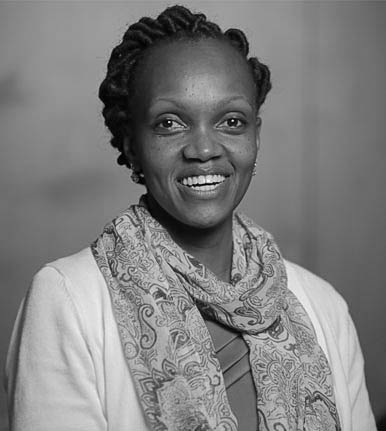
Dr. Juliet O. Awori, MBChB
Supervisors
Prof. Anthony Scott

Prof. Anthony Scott
Affiliation(s):
London School of Hygiene & Tropical Medicine
Nuffield Department of Medicine, University of Oxford
Anthony Scott trained in clinical infectious diseases and in epidemiology before coming to work in Kilifi in 1993 as a Wellcome Trust Training Fellow. He started studying the aetiology and risk factors of pneumonia in adults and subsequently investigated natural immunity, diagnostics, host-susceptibility and transmission epidemiology of pneumococcal disease in children. In 2000, he set up the Kilifi Health and Demographic Surveillance System with Tom Williams. In 2004, Anthony initiated a regional network of surveillance for pneumococcal disease (netSPEAR) with Mike English. Currently, he is a Wellcome Trust Senior Fellow and Professor of Vaccine Epidemiology at the London School of Hygiene and Tropical Medicine.
Mentors
Dr. Evelyn Gitau

Dr. Evelyn Gitau
Dr. Evelyn Gitau is the Director of Research Capacity Strengthening. Under her direction, the division will continue to grow its signature fellowship program, the Consortium for the Advancement of Research Training in Africa (CARTA), and expand opportunities across the continent for African scholars to become great research leaders.
Dr. Gitau’s most recent role was as a program manager at the African Academy of Sciences, where she stewarded the Grand Challenges Africa at the Academy under the Alliance for Accelerating Excellence in Science in Africa (AESA) program. Prior to that, she was part of the team at the KEMRI-Wellcome Trust Program in Kilifi, Kenya, conducting research on developing biomarkers of disease among seriously ill children.
Dr. Gitau earned her PhD in Life Sciences from the Open University/Liverpool School of Tropical Medicine in the UK, investigating neurological infections in children living in malaria-endemic areas. She has more than 15 years of experience in medical research.
Among her awards and accomplishments include a 2015 appointment as a fellow of the Next Einstein Forum, where she is the ambassador for the development of Science, Technology, Engineering and Mathematics in Africa.
Dr. Gitau’s vast networks have brought her positions on numerous advisory boards for organizations advancing the agenda of research and evidence generation in Africa. These include the Independent Scientific Advisory Board (ISAB), Malawi-Liverpool-Wellcome Trust Clinical Research Programme College of Medicine, Blantyre, Malawi, University of Oxford (MSc International Health and Tropical Medicine) and and the Investment Committee Grand Challenges Canada. She will remain a member of the Steering Committee for Grand Challenges Africa.


Prof. Jay Berkley
Affiliations:
Nuffield Department of Medicine, Oxford University
Jay is a consultant paediatrician and sub-specialist in paediatric infectious diseases and immunology based at the KEMRI Centre for Geographic Medicine Research – Coast and Wellcome Trust Research Programme in Kilifi, Kenya. Jay leads a research group focusing on infection and inflammation in childhood malnutrition, and on perinatal health. Jay joined the KEMRI/Wellcome Trust Collaborative Research Programme in Kilifi, Kenya in 1997. He undertook a Wellcome Trust Research Training Fellowship on invasive bacterial infections and their relationships with malaria, HIV and malnutrition. After completing specialist training in paediatrics and sub-specialist training in paediatric clinical immunology and infectious diseases in the UK, Jay returned to Kilifi. His current Wellcome Trust Intermediate Clinical Research Fellowship is on tackling infection and inflammation to prevent mortality in malnourished children. Jay is involved in the Kenyan national training programme on integrated management of severe acute malnutrition and is an expert adviser to the Ministries of Health and the World Health Organisation.


Prof. Caroline Jones
Affiliation(s):
Caroline Jones, a senior social scientist, joined the KEMRI-Wellcome Trust Research Programme in Kilifi from the London School of Hygiene and Tropical Medicine in February 2010. With a background in medical anthropology her research over the past 15 years has focused on treatment seeking and preventive behaviors for malaria and the factors that influence provider practices in sub-Saharan Africa. More recently she has been looking at the implement ability and sustainability of public health interventions, focusing on issues relating to social relationships, organizational structure and management and leadership. Research capacity strengthening and the promotion of the appropriate use of high quality social science research in the development and implementation of public health policy are major concerns underpinning much of her work. A key role in her current position is to contribute to building Kenyan and regional expertise to develop and lead such research.


Dr. Sara Atkinson
 Email : SAtkinson@kemri-wellcome.org
Email : SAtkinson@kemri-wellcome.org Biography
I am a Senior Lecturer and Honorary Consultant in Paediatric Infectious Disease in the Department of Paediatrics at the University of Oxford and at the KEMRI-Wellcome Trust Research Programme (KWTRP) in Kilifi, Kenya. I received my medical degree from Guy’s and St Thomas’ Medical School in London and completed clinical training in London, Newcastle and Oxford. My PhD was based at LSHTM and MRC, The Gambia. I first came to KWTRP as a Clinical Research Fellow in 2004 before being appointed as a Clinical Lecturer in Paediatrics at the University of Oxford in 2007. I have been based at KWTRP since 2013.
Research
Both infectious diseases and micronutrient deficiencies are widespread among children living in sub-Saharan Africa. My research questions concern the impact that infections and nutrient deficiencies have on each other. For example: could malaria and other infections be a causal factor in the widespread prevalence of iron deficiency in African children? We found that iron deficiency increases markedly over a malaria season. The hormone hepcidin, the master iron regulator, prevents iron absorption and recycling leading to low iron levels. We found that even asymptomatic malaria infection strongly induces hepcidin in Kenyan children. We are using genetic and epidemiological methods to investigate the impact of malaria on iron deficiency. It is possible that elimination of malaria may also prevent an important cause of iron deficiency for children living in sub-Saharan Africa.
The safety of iron supplementation is an important concern as studies suggest that iron deficiency protects children from malaria and other infections. I am using a Mendelian randomization (MR) approach to address the question of whether a child’s iron status is causally related to their risk of severe malaria and/or bacteraemia. MR is an approach that utilizes the random allocation of genetic variants at conception to investigate causality between an intermediate trait (iron status) and disease (severe infection). In order to identify genetic variants for use in MR, I am conducting the first GWAS study of iron status (including hepcidin) in African populations. Validated genetic variants will be taken forward to large MR case-control studies of severe malaria and bacteraemia using stored samples from the Kilifi Biobank and the MalariaGEN Consortium.
Juliet is working on access to care for childhood pneumonia treatment. Her work will focus on the determinants of pneumonia outcomes in children who are treated in government outpatient facilities in two rural communities in Kenya. She will describe how pneumonia treatment is given at the clinics, the treatment outcomes of children who are treated for pneumonia in these clinics and the social and cultural contexts that determine why and when these parents seek treatment for their sick children.
She is a Medical Epidemiologist with six years experience working on childhood pneumonia field studies, including a large multicenter epidemiological study and a phase 1/2 vaccine clinical trial.
- 51
- 66
- 48
- 104
- 44
- 423

